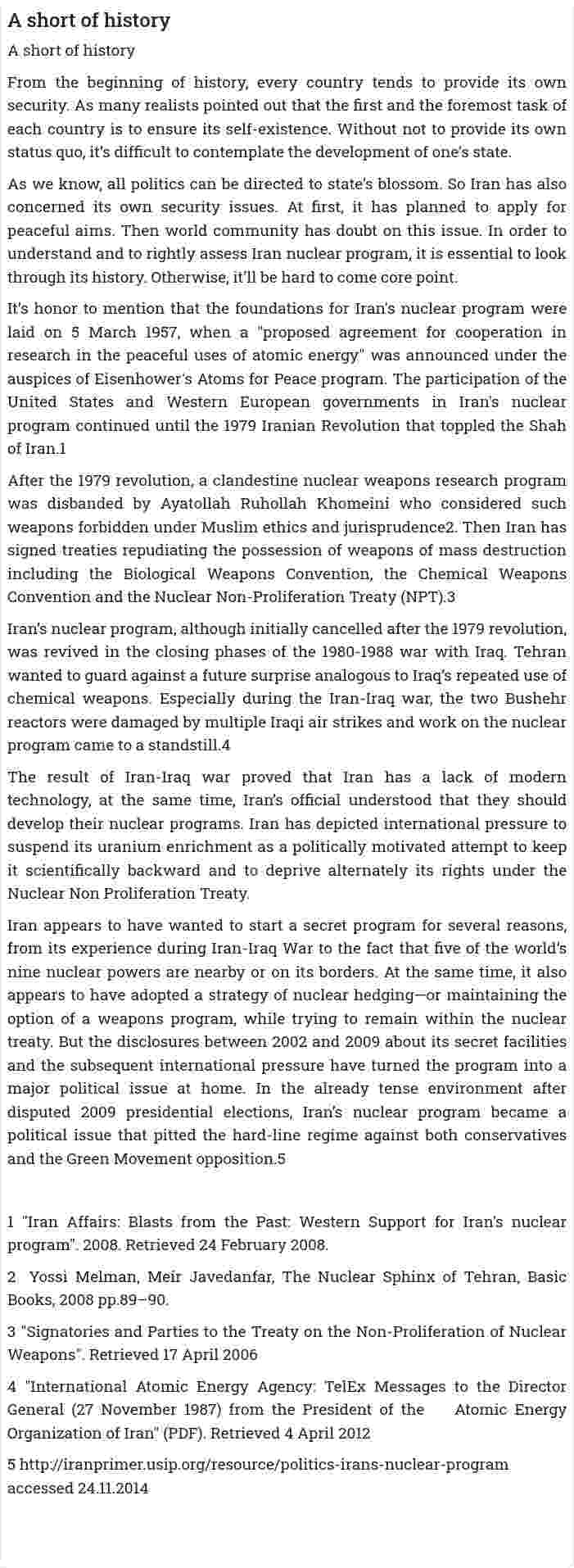
A short of history
A short of history
From the beginning of history, every country tends to provide its own security. As many realists pointed out that the first and the foremost task of each country is to ensure its self-existence. Without not to provide its own status quo, it’s difficult to contemplate the development of one’s state.
As we know, all politics can be directed to state’s blossom. So Iran has also concerned its own security issues. At first, it has planned to apply for peaceful aims. Then world community has doubt on this issue. In order to understand and to rightly assess Iran nuclear program, it is essential to look through its history. Otherwise, it’ll be hard to come core point.
It’s honor to mention that the foundations for Iran's nuclear program were laid on 5 March 1957, when a "proposed agreement for cooperation in research in the peaceful uses of atomic energy" was announced under the auspices of Eisenhower's Atoms for Peace program. The participation of the United States and Western European governments in Iran's nuclear program continued until the 1979 Iranian Revolution that toppled the Shah of Iran.1
After the 1979 revolution, a clandestine nuclear weapons research program was disbanded by Ayatollah Ruhollah Khomeini who considered such weapons forbidden under Muslim ethics and jurisprudence2. Then Iran has signed treaties repudiating the possession of weapons of mass destruction including the Biological Weapons Convention, the Chemical Weapons Convention and the Nuclear Non-Proliferation Treaty (NPT).3
Iran’s nuclear program, although initially cancelled after the 1979 revolution, was revived in the closing phases of the 1980-1988 war with Iraq. Tehran wanted to guard against a future surprise analogous to Iraq’s repeated use of chemical weapons. Especially during the Iran-Iraq war, the two Bushehr reactors were damaged by multiple Iraqi air strikes and work on the nuclear program came to a standstill.4
The result of Iran-Iraq war proved that Iran has a lack of modern technology, at the same time, Iran’s official understood that they should develop their nuclear programs. Iran has depicted international pressure to suspend its uranium enrichment as a politically motivated attempt to keep it scientifically backward and to deprive alternately its rights under the Nuclear Non Proliferation Treaty.
Iran appears to have wanted to start a secret program for several reasons, from its experience during Iran-Iraq War to the fact that five of the world’s nine nuclear powers are nearby or on its borders. At the same time, it also appears to have adopted a strategy of nuclear hedging—or maintaining the option of a weapons program, while trying to remain within the nuclear treaty. But the disclosures between 2002 and 2009 about its secret facilities and the subsequent international pressure have turned the program into a major political issue at home. In the already tense environment after disputed 2009 presidential elections, Iran’s nuclear program became a political issue that pitted the hard-line regime against both conservatives and the Green Movement opposition.5
1 "Iran Affairs: Blasts from the Past: Western Support for Iran's nuclear program". 2008. Retrieved 24 February 2008.
2 Yossi Melman, Meir Javedanfar, The Nuclear Sphinx of Tehran, Basic Books, 2008 pp.89–90.
3 "Signatories and Parties to the Treaty on the Non-Proliferation of Nuclear Weapons". Retrieved 17 April 2006
4 "International Atomic Energy Agency: TelEx Messages to the Director General (27 November 1987) from the President of the Atomic Energy Organization of Iran" (PDF). Retrieved 4 April 2012
5 http://iranprimer.usip.org/

- Aspergillus terreus — продуцент ітаконової кислоти
- Assimilation of borrowings
- ATL и BTL технологии
- ATL – коммуникации – особенности и виды
- ATM over ADSL жабдығына салыстырмалы талдау жасау
- A Trainee-centered approach in teaching a foreign language
- Ausdrucksmittel der Bedingung in der deutschen Gegenwartssprache (am Beispiel der schönen Literatur)
- ArcGIS – инструментальная полуавтоматическая ГИС
- Architectural conservation
- Arcsin d комплексной плоскости
- Argentine Republic. Politics of Argentina
- Argumentation of expediency of JV creation with foreign partner
- AS DNB finansiāla stāvokļa analīze
- A/S Dzintars produkcijas virzīšana tirgū

